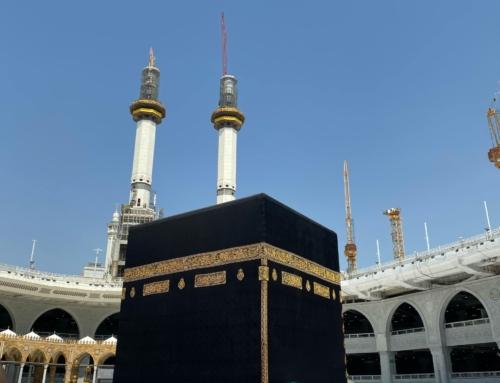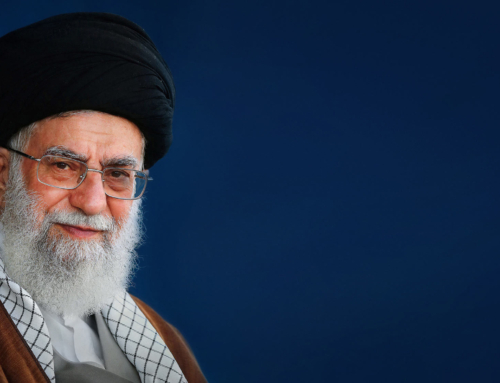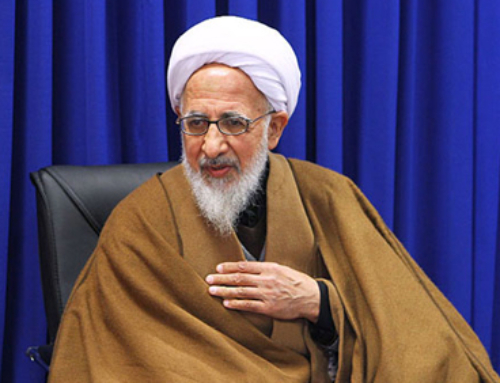بِسْمِ اللَّهِ الرَّحْمَٰنِ الرَّحِيمِ
ثم الصلاة و االسلام على نبينا واله. أما بعد قال الله في كتابه الكريم
بِسْمِ اللَّهِ الرَّحْمَٰنِ الرَّحِيمِ
وَلَا يَحْسَبَنَّ الَّذِينَ كَفَرُوا أَنَّمَا نُمْلِي لَهُمْ خَيْرٌ لِّأَنفُسِهِمْ ۚ إِنَّمَا نُمْلِي لَهُمْ لِيَزْدَادُوا إِثْمًا ۚ وَلَهُمْ عَذَابٌ مُّهِينٌ
Let the faithless not suppose that the respite that We grant them is good for their souls: We give them respite only that they may increase in sin, and there is a humiliating punishment for them.
This is an Ayah that was recited by Lady Zainab a.s. After having witnessed the tragedy of Karbala, the killing of her family and the companions of Imam Hussain a.s, after which she also witnessed the massacre of her brother, Imam Hussain a.s., with the trampling of horses over him, and the swords thrusting down upon his holy body, while still thirsty, and while hearing the screams of his family in the camp.
In historical accounts, it is narrated that when Imam Hussain (peace be upon him) was martyred on the orders of Yazid, his family was taken captive to Yazid’s palace in Sham.
Lady Zainab and the woman, children and the sick who were captured were then forced to walk or ride without a saddle through the rough, hot deserts while chained, led to Kufa and finally Sham. This is not an easy task.
Zainab, the daughter of Ali ibn Abi Talib, and her mother Fatimah, the daughter of the Messenger of Allah (peace be upon him and his family), stood up—after Yazid’s mockery and his treatment of the head of Hussain (peace be upon him)—and said:
الْحَمْدُ لِلَّهِ رَبِّ الْعالَمِينَ، وَصَلَّى اللَّهُ عَلَى جَدِّي سَيِّدِ الْمُرْسَلِينَ، صَدَقَ اللَّهُ سُبْحَانَهُ كَذَلِكَ يَقُولُ
All praise is due to Allah, the Lord of the worlds, and may Allah’s blessings be upon my grandfather, the master of the messengers. Allah, the Exalted, has spoken the truth, as He says:
ثُمَّ كَانَ عَاقِبَةَ الَّذِينَ أَسَاءُوا السُّوأَىٰ أَن كَذَّبُوا بِآيَاتِ اللَّهِ وَكَانُوا بِهَا يَسْتَهْزِئُونَ
Then the fate of those who committed misdeeds was that they denied the signs of Allah and they used to deride them.[1]
أَظَنَنْتَ يَا يَزِيدُ حِينَ أَخَذْتَ عَلَيْنَا أَقْطَارَ الْأَرْضِ، وَضَيَّقْتَ عَلَيْنَا آفَاقَ السَّمَاءِ، فَأَصْبَحْنَا لَكَ فِي إِسَارٍ، نُسَاقُ إِلَيْكَ سَوْقاً فِي قِطَارٍ، وَأَنْتَ عَلَيْنَا ذُو اقْتِدَارٍ، أَنَّ بِنَا مِنَ اللَّهِ هَوَاناً وَعَلَيْكَ مِنْهُ كَرَامَةً وَامْتِنَاناً؟؟ وَأَنَّ ذَلِكَ لِعِظَمِ خَطَرِكَ وَجَلَالَةِ قَدْرِكَ؟؟ فَشَمَخْتَ بِأَنْفِكَ وَنَظَرْتَ فِي عِطْفٍ، تَضْرِبُ أَصْدَرَيْكَ فَرِحاً وَتَنْفُضُ مِدْرَوَيْكَ مَرِحاً حِينَ رَأَيْتَ الدُّنْيَا لَكَ مُسْتَوْسِقَةً وَالْأُمُورَ لَدَيْكَ مُتَّسِقَةً وَحِينَ صَفِيَ لَكَ مُلْكُنَا وَخَلَصَ لَكَ سُلْطَانُنَا.
Did you think, O Yazid, when you took control of the expanses of the earth and restricted the horizons of the sky upon us, making us captives at your mercy, led before you as prisoners in a line, with you exercising power over us, that this reflected disgrace from Allah upon us and honor and grace upon you? Did you think this was due to your great worth and exalted rank? So you held your head high, looked with arrogance, beat your chest in joy, and strutted with pride, seeing the world submissive to you and affairs aligned in your favor, when our sovereignty and authority were laid bare for you.
فَمَهْلًا مَهْلًا لَا تَطِشْ جَهْلًا! أَ نَسِيتَ قَوْلَ اللَّهِ
وَلَا يَحْسَبَنَّ الَّذِينَ كَفَرُوا أَنَّمَا نُمْلِي لَهُمْ خَيْرٌ لِّأَنفُسِهِمْ ۚ إِنَّمَا نُمْلِي لَهُمْ لِيَزْدَادُوا إِثْمًا ۚ وَلَهُمْ عَذَابٌ مُّهِينٌ
So take heed, take heed, and do not act foolishly in ignorance! Have you forgotten the words of Allah:
Let the faithless not suppose that the respite that We grant them is good for their souls: We give them respite only that they may increase in sin, and there is a humiliating punishment for them.[2]
أَمِنَ الْعَدْلِ يَا ابْنَ الطُّلَقَاءِ تَخْدِيرُكَ حَرَائِرَكَ وَسَوْقُكَ بَنَاتِ رَسُولِ اللَّهِ سَبَايَا؟؟ قَدْ هَتَكْتَ سُتُورَهُنَّ وَأَبْدَيْتَ وُجُوهَهُنَّ يَحْدُو بِهِنَّ الْأَعْدَاءُ مِنْ بَلَدٍ إِلَى بَلَدٍ وَيَسْتَشْرِفُهُنَّ أَهْلُ الْمَنَاقِلِ وَيَبْرُزْنَ لِأَهْلِ الْمَنَاهِلِ وَيَتَصَفَّحُ وُجُوهَهُنَّ الْقَرِيبُ وَالْبَعِيدُ وَالْغَائِبُ وَالشَّهِيدُ وَالشَّرِيفُ وَالْوَضِيعُ وَالدَّنِيُّ وَالرَّفِيعُ، لَيْسَ مَعَهُنَّ مِنْ رِجَالِهِنَّ وَلِيٌّ وَلَا مِنْ حُمَاتِهِنَّ حَمِيمٌ، عُتُوّاً مِنْكَ عَلَى اللَّهِ وَجُحُوداً لِرَسُولِ اللَّهِ وَدَفْعاً لِمَا جَاءَ بِهِ مِنْ عِنْدِ اللَّهِ، وَلَا غَرْوَ مِنْكَ وَلَا عَجَبَ مِنْ فِعْلِكَ.
Is it just, O son of the freed captives, that you veil your women and parade the daughters of the Messenger of Allah as captives? You have torn their veils and exposed their faces, leading them through cities from one land to another, while the enemies look upon them, the strangers and the locals scrutinize them, and the noble and the lowly, the near and the distant, gaze upon them. There is no protector from their men, nor any defender from their kin. This is your audacious defiance against Allah, your denial of His Messenger, and your rejection of what he brought from Allah. It is no surprise, nor is it unexpected, from someone like you.
Lady Zainab a.s. Continues in her speech… But it is the choice of this Ayah that I want to discuss:
وَلَا يَحْسَبَنَّ الَّذِينَ كَفَرُوا أَنَّمَا نُمْلِي لَهُمْ خَيْرٌ لِّأَنفُسِهِمْ ۚ إِنَّمَا نُمْلِي لَهُمْ لِيَزْدَادُوا إِثْمًا ۚ وَلَهُمْ عَذَابٌ مُّهِينٌ
Let the faithless not suppose that the respite that We grant them is good for their souls: We give them respite only that they may increase in sin, and there is a humiliating punishment for them.
- In Your Face: Let the faithless not suppose: In the face of tyrant, she calls him faithless. No fear. This is where women will rise – in the face of Tyranny. In the face of oppression. In the face of men who claim thrones, but are nothing more than drunk, faithless, low lives. Woman here will rise.
- وَلَا يَحْسَبَنَّ : is used by the Holy Quran to talk to disbelievers and hypocrites, as well as those with weak faith. These people do not have the capacity to perceive the Truth. They:
- Take creation to be futile,
- view martyrdom as annihilation,
- See the world as eternal,
- Believe honor comes from reliance on disbelievers,
- And perceive their long lives as a source of good and blessing.The Quran refutes all these misconceptions, emphasizing the truth and dispelling these false notions.[3]
- They think they are worthy??: These people consider their possession of resources, achievements of victories, and comfortable living as indicators of their own worthiness. However, God grants them respite despite their immersion in disbelief and corruption, allowing them to continue in their path of ruin.
- The Higher they Rise, the harder they fall: Yazid, with great arrogance, said to Lady Zainab, “Did you see that God is with us?” In response, Lady Zainab recited this verse and declared, “I find you base and despicable, deserving of every form of contempt. Do whatever you wish, but by God, you cannot extinguish the light of God.” Indeed, for such hedonistic individuals, a humiliating punishment is prepared, so that their imagined worldly honor will be accompanied by disgrace and humiliation in the Hereafter.
- Criminals can be categorized into two types: those who are capable of reform and those who are not.
a)For the former, God provides warnings and awakens them through sermons and life’s bitter and sweet experiences.
b)As for the latter, who are not open to guidance, God leaves them to their own devices, allowing all their potential for wrongdoing to manifest. Regarding this, Imam Baqir (peace be upon him) stated under this verse that death is a blessing for disbelievers, because the longer they live, the more they sin.
“and there is a humiliating punishment for them.”
What are the lessons from this Ayah, and why Lady Zainab used it?
- Disbelief, weak faith, hypocrisy: all of these lead to ruin.
- A good life does not mean this is a reward or love from God, but can be their fuel in hell fire.
- Everyone wants “khair” good: but some mistake the bad for being good.
- Length of life is not important, rather, appropriate use of it. Not being lost, chasing bad as though it is good.
- Blessings are only beneficial when they are used for growth and good, not for evil and sin.
- Blessing of life: Imam Sajjad in the supplication for Makaram Al Akhlaq: Says
وَ عَمِّرْنِي مَا كَانَ عُمْرِي بِذْلَةً فِي طَاعَتِكَ ، فَإِذَا كَانَ عُمْرِي مَرْتَعاً لِلشَّيْطَانِ فَاقْبِضْنِي إِلَيْكَ قَبْلَ أَنْ يَسْبِقَ مَقْتُكَ إِلَيَّ ، أَوْ يَسْتَحْكِمَ غَضَبُكَ عَلَيَّ .
“And grant me life as long as my life is spent in devotion to You. But if my life becomes a pasture for Satan, then take me to Yourself before Your wrath precedes me or Your anger becomes firmly established upon me.”[4]
- Do not be quick to judge and wish for what others have… We do not know why they have it: and there is a humiliating punishment for them.
- The prosperity and dominance of tyrants do not indicate God’s approval of them. Similarly, it does not justify our silence in the face of their actions.
And the last point is the one that we leave with you, the reader. Silence in the face of oppression has no justification, no matter how weak we think we are, nor how strong the oppressor thinks they are.
Lady Zainab, we stand in awe of your greatness in the face of the tyranny, despite all the hardship you tolerated and faced, your honour and dignity, eloquence and force is a lesson for all of us today, all Muslim Women, and all Muslim Men. Not all that, but for all humanity.
Standing Against Oppression Is A Duty, Not A Choice.
[1] Surah Al Rome Ayah 10
[2] Surah Al Imran Ayah 178
[3] Tafseer Noor, Qaraiti, V1. P658.
[4] The 5th phrase of the Supplication of Imam Sajjad for Exalted Morals (Makarim Al Akhlaq)



